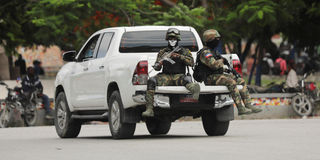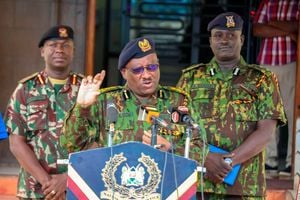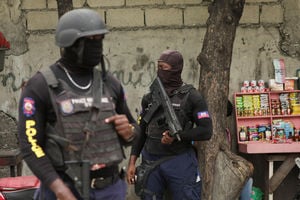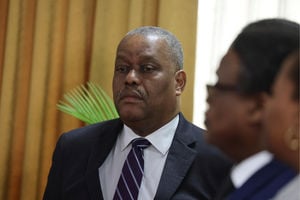
Soldiers patrol the area around the presidential palace, in Port-au-Prince, Haiti May 24, 2024.
A Haiti-based lobby has written to the United Nations to express concern over the Kenyan police brutality on protesters, journalists and civil society activists during protests against the Finance Bill in Nairobi on Tuesday, June 18.
A contingent of 1,000 police officers is scheduled to go to the war-torn Caribbean nation, but questions over the legality of a deal Nairobi made with Port-au-Prince are yet to be finalised.
In a letter to the United Nations Human Rights Council, the Movement Unforgettable Dessalines Jean Jacques (MUDJJ) said they were not amused by how Kenyans were treated by the uniformed officers and condemned the brutality meted out on unarmed civilians.
“We have observed with dismay the harassment of journalists while performing their duties, the use of teargas against peaceful protesters, and the arrest of activists such as Hanifa Farsafi, who were exercising their rights in response to the financial bill of 2024 imposed by President Ruto,” MUDJJ President, Eliphete Joseph, said.
Mr Joseph said their concerns are beyond the borders of Kenya and added that they were “deeply troubled” by the potential implications the Kenyan police’s behaviour may have on the people of Haiti.
Kenyan police will be leading the Multinational Security Support (MSS) mission in Haiti after the United Nations Security Council approved the Mission in late 2023.
Other countries that will be involved in the peace mission include Benin, the Bahamas, Jamaica, Guyana, Barbados, Antigua and Barbuda, Bangladesh and Chad.
Since the pronouncement, hundreds of Kenyan police have undergone training and taken French classes in preparation for their deployment. Kenyans speak English, Swahili and other Indigenous languages while Haitian French and Creole are the official languages of Haiti.
MUDJJ has opposed the MSS since it was announced by the UN and now wants the United Nations Human Rights Council, Amnesty International, and the African Union to scrutinise and question the United States government and the UN Security Council regarding the MSS deployment in Haiti.
For Eliphete, it is a very difficult thing to teach an old dog new tricks and going by how protests have been handled in Kenya, and does not want the same kind of officers deployed to Haiti.
“Given the recent examples of police brutality in Kenya, we fear that similar oppressive tactics could be employed against the Haitian people. It is crucial to ascertain whether these actions will align with the values of human rights and justice, and if such behaviour would be acceptable if directed towards American citizens,” he said.
For the civil society group, the world belongs to all human beings, and no single group should have the privilege to live free at the expense of others.
As such, the Haitian people, like all people, deserve to live in freedom and dignity.
“We demand that immediate attention and action be taken to ensure that the rights of the Haitian people are respected and protected. We look forward to your prompt and just response to this critical matter,” MUDJJ’s letter to the UNHCR stated.
This development comes almost a month after MUDJJ reached out to lawyer and Thirdway Alliance party leader Ekuru Aukot to thank him after he filed an application in court asking that the government be held in contempt over plans to send 200 police to Haiti.
The movement said that the move by the lawyer who has been at the forefront in opposing the deployment of the officers to Haiti and even filed a case in court to stop the process, was well-guided.
“We deeply appreciate your principled stance against the deployment of Kenyan police forces to Haiti, a move that many, including ourselves, view as unconstitutional and misaligned with the interest of the Haitian people,” reads a letter the group wrote to Mr Aukot, and which is in our possession.
It further said the move by Mr Aukot resonates well with Haitians.
So far, Kenya has notified the Council of leading the Mission but has not yet deployed troops. President William Ruto had, last month while on a state visit to the US, indicated the police could deploy anytime in June.
Although Nairobi has held various reconnaissance visits to Haiti, and held meetings with Haitian officials in Nairobi, the MSS itself was delayed for several months after Haitian transitional government Ariel Henry resigned shortly after signing a deployment deal with Nairobi. That deal itself was court-ordered after activists sued Kenya for engaging in an illegal mission. A court case is still pending in court.
But one of the concerns for activists in Kenya and Haiti has been what they call lack of transparency on the rules of engagement. The UN Security Council resolution 2699 (2023) tasked Kenya in consultation with Haiti and other troop contributors to develop the rules of engagement for the MSS.
It said those rules “should be in full respect of Haiti’s sovereignty and in strict compliance with international law, including, international human rights law, as applicable.”
“Past multinational or foreign security missions in Haiti have been tarnished by widespread human rights violations and rampant impunity. That is why all the necessary measures must be taken both prior to and for the entire duration of any deployment in Haiti to prevent history from repeating itself,” said Ana Piquer, Amnesty International’s Americas Director, last week.
That transparency involves vetting of police to be deployed, pre-deployment and in-theater training of basic United Nations principles, human rights law, prevention of sexual exploitation and abuse, civilians and child protection, Amnesty said.
“It is also essential that an independent mechanism be in place to receive complaints, investigate all allegations of human rights violations, rule on redress, and refer individual cases to a Haitian civilian court, or any jurisdiction of a country providing personnel for investigation and, where appropriate, prosecution,” said the rights watchdog.
As Kenya’s police chiefs host their Haitian counterparts this week for discussions on actual deployment, the Multinational Security Support Mission (MSS) is facing a time lapse before actual work begins, and pressure from activists to declare safeguards on any violations of local civilian rights.
On Tuesday, June 17, Kenya’s Inspector-General of Police Japhet Koome hosted Hiatian police chiefs led by Joachim Prohete in Nairobi. Prohete reportedly told his hosts Haiti was “counting” on Kenya’s support, according to a dispatch from the National Police Service.
“NPS (National Police Service) remains committed to collaboration in the Mission,
for the good of the people of Haiti especially women and children,” Koome said after a meeting attended by hid deputies Douglas Kanja, and Noor Gabow, who is to lead the MSS.
The UN Security Council, in Resolution 2699 (2023) passed last year on October 2 indicates that the MSS was to operate for an initial 12 months from the date the resolution was approved.
The Resolution said participating states should notify the UN Secretary General as well as their lead country and work in “in close cooperation and coordination with the Government of Haiti, for an initial period of twelve months following the adoption of this resolution, to be reviewed nine months after the adoption of this resolution…” Haiti is not on the official programme for the UN Security Council sessions this month.
The MSS, endorsed by the UN Security Council, is not actually a UN-financed peacekeeping mission. It is to be run on voluntary contributions from member states to meet the cost of what the UN called as a “temporary mission” but which must run in strict compliance of international law and international human rights law.








